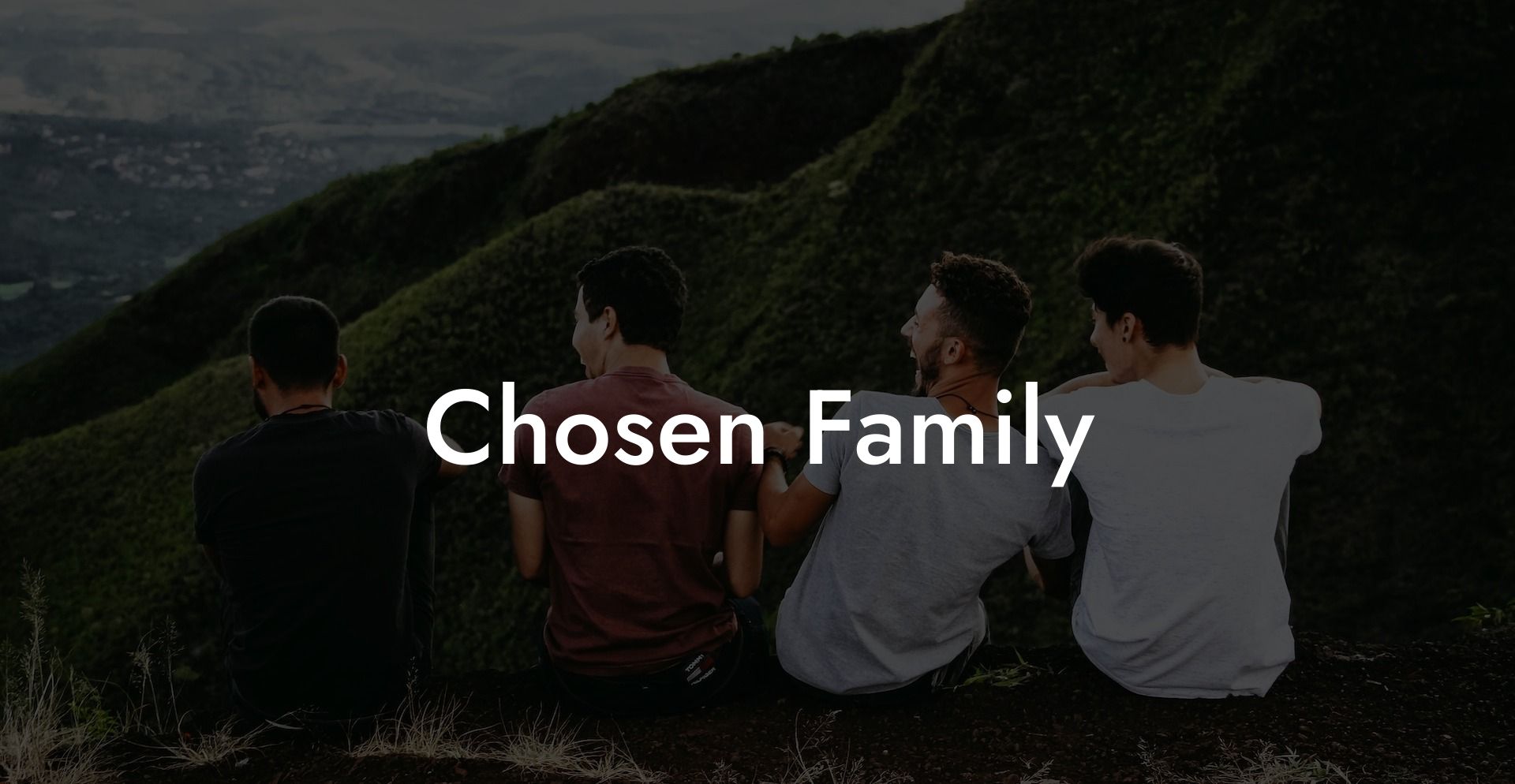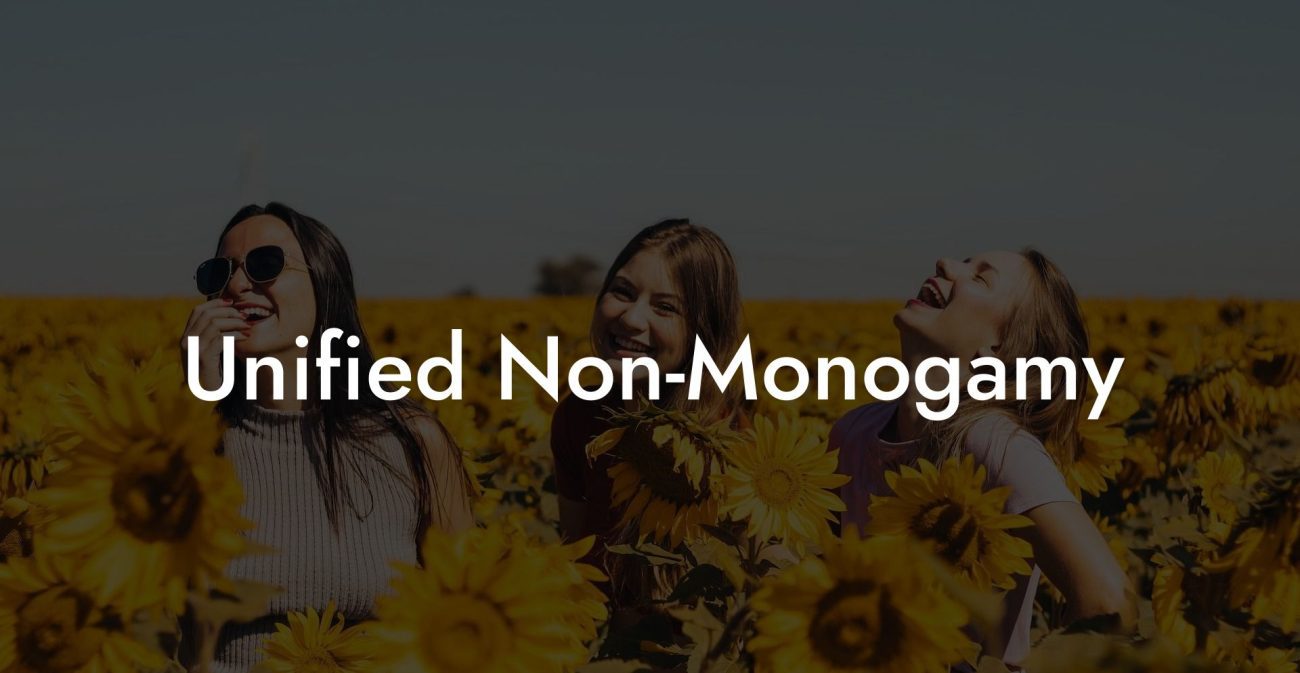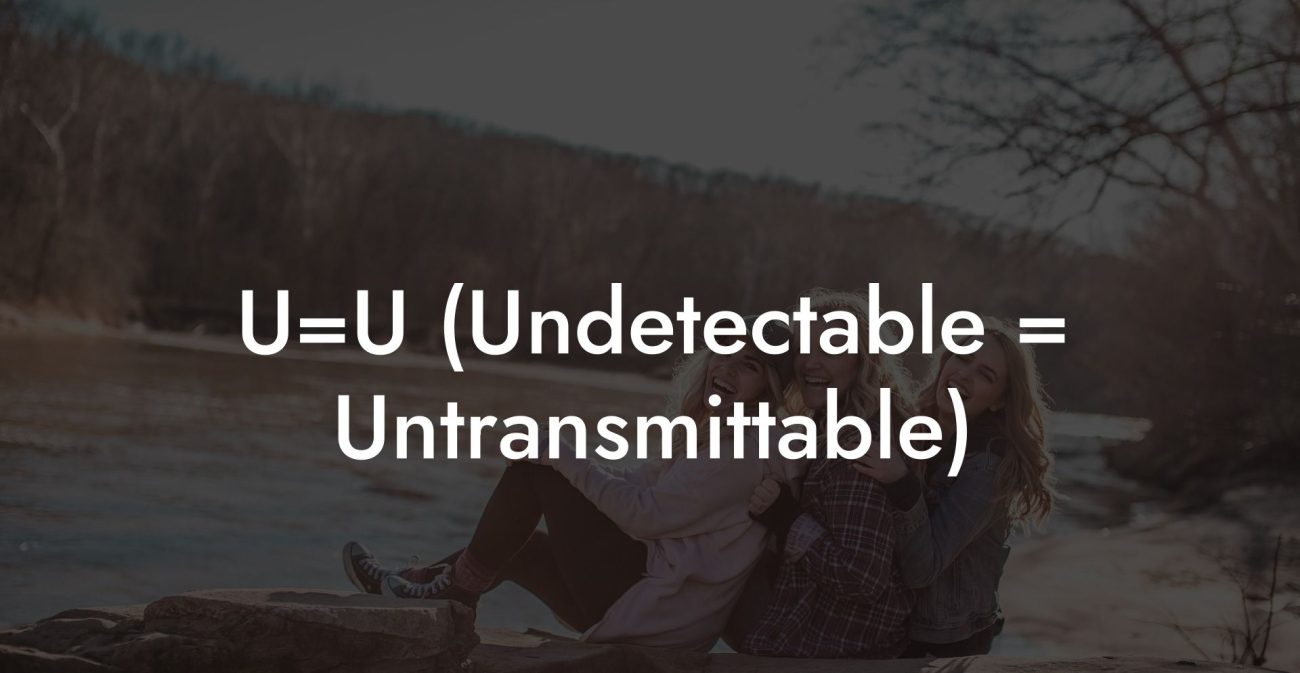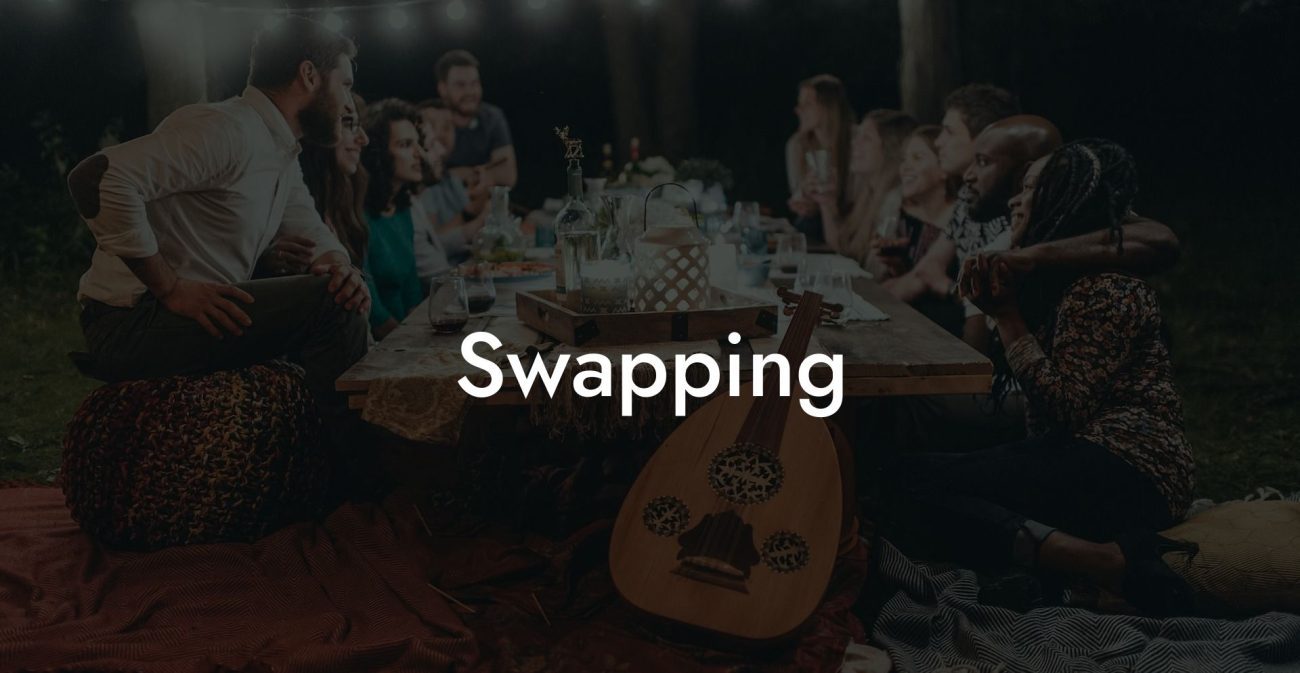Chosen Family

Ever feel like your crew is more than just a bunch of friends? Welcome to the wild world of chosen family, where bonds are forged not by blood, but by mutual support, shared adventures, and a whole lot of heart. In ethical non monogamy, chosen family is the ultimate power network, a group of people who aren’t just in your life; they ARE your life. Forget traditional family trees; here, we’re planting our own gardens of connection, where every member is handpicked for their unique qualities and unwavering loyalty. Get ready to dive into the vibrant, supportive, and sometimes hilariously unconventional world of chosen family in ethical non monogamy.
Quick Links to Useful Sections
- The Ethical Non Monogamy Term: Chosen Family
- Defining Chosen Family
- The Role of Chosen Family in Ethical Non Monogamy
- A Quick Video Explanation
- Historical and Cultural Perspectives on Chosen Family
- Origins of the Concept
- Cultural Impact Today
- The Benefits of a Chosen Family in Ethical Non Monogamy
- Diverse Emotional Support
- Empowerment and Autonomy
- Enhanced Communication and Trust
- Flexibility and Adaptability
- Challenges in Building and Maintaining a Chosen Family
- Managing Expectations
- Balancing Individual Autonomy and Collective Needs
- Navigating External Stigma
- Maintaining Consistent Communication
- Practical Strategies for Cultivating a Strong Chosen Family
- Invest in Regular Communication
- Create a Shared Vision and Set Collective Goals
- Embrace Flexibility and Individual Growth
- Utilize Digital Tools for Coordination
- Seek Professional Guidance When Necessary
- Frequently Asked Questions (FAQ)
- Resources and Community Support: Your Next Steps
The Ethical Non Monogamy Term: Chosen Family
Defining Chosen Family
Chosen family refers to the network of individuals you select to be your support system, regardless of blood ties. In the context of ethical non monogamy, it often encompasses partners, close friends, and allies who share similar values and provide emotional, social, and sometimes practical support. This family is “chosen” because it’s built on mutual respect, consent, and the understanding that love isn’t limited to biology.
Unlike traditional family structures that are defined by legal or biological relationships, chosen family is fluid, dynamic, and uniquely tailored to the needs of its members. It’s about creating a community where every member is valued equally and contributes to the collective well-being.
The Role of Chosen Family in Ethical Non Monogamy
In ethical non monogamy, the concept of chosen family takes center stage. When you form multiple intimate relationships, your network can extend far beyond your primary partner. Your chosen family might include:
- Primary and Secondary Partners: Individuals who share deep emotional and/or physical bonds with you.
- Close Friends: Companions who provide support, advice, and a sense of belonging even if they are not romantically involved.
- Community Members: People who share your values and lifestyle, contributing to a supportive network that reinforces your identity.
- Mentors and Allies: Those who offer guidance, share experiences, and help navigate the complexities of non-monogamous life.
Chosen family is not about replacing biological family; it’s about expanding your support network to include those who truly understand your journey. In a world that can sometimes be judgmental of alternative lifestyles, your chosen family becomes a sanctuary, a group that validates your choices and helps you flourish.
A Quick Video Explanation

Historical and Cultural Perspectives on Chosen Family
Origins of the Concept
The idea of chosen family isn’t new, it has roots in many marginalized communities that have had to create their own support systems when traditional family structures failed them. From LGBTQ+ communities to artists and countercultural movements, people have long turned to one another to build families based on shared experiences and mutual support.
In the realm of ethical non monogamy, chosen family evolved as individuals began to reject the constraints of conventional family expectations. As more people embraced diverse relationship models, the need for a supportive, non-judgmental network grew. This gave rise to communities where love is defined by mutual care rather than legal or biological ties.
Cultural Impact Today
Today, chosen family is a celebrated concept in many progressive circles. Social media, online forums, and community events have helped people connect, share their stories, and form deep bonds that transcend traditional definitions. In ethical non monogamy, chosen family can be seen as a natural extension of the belief that love is abundant and that every relationship is worth nurturing.
Modern chosen families often function as mini-communities where resources, advice, and emotional support are shared openly. They challenge the old notion that family is solely defined by blood and instead promote a more inclusive, expansive view of kinship.
The Benefits of a Chosen Family in Ethical Non Monogamy
Diverse Emotional Support
One of the most significant advantages of having a chosen family is the diverse range of support it offers. Each member brings unique perspectives, skills, and emotional strengths to the table, creating a rich tapestry of care and support.
- Emotional Resilience: With multiple people to lean on, you’re less likely to feel isolated during tough times.
- Varied Perspectives: Different viewpoints can help you navigate challenges and see situations from new angles.
- Collective Wisdom: Shared experiences and advice from your chosen family can be invaluable in managing the complexities of ethical non monogamy.
Empowerment and Autonomy
When you choose your own family, you’re empowered to define relationships on your own terms. This sense of autonomy fosters personal growth and reinforces the idea that your support system is built on genuine connection rather than societal obligation.
- Personal Freedom: Being part of a chosen family allows you to explore your identity without the constraints of traditional expectations.
- Mutual Empowerment: Every member contributes to an environment of respect and equality, which in turn empowers you to pursue your passions and interests.
Enhanced Communication and Trust
A well-formed chosen family thrives on transparent communication. Regular interactions and shared experiences build trust and strengthen bonds, making it easier to navigate the ups and downs of non-monogamous life.
- Open Dialogue: Frequent conversations help address issues before they escalate and ensure that everyone’s needs are met.
- Trust Building: A network of trusted individuals creates a safe space where vulnerability is encouraged and celebrated.
Flexibility and Adaptability
Chosen family is dynamic. As your needs and circumstances change, so too can your support network. This flexibility allows for continuous adaptation and growth, ensuring that your relationships remain relevant and fulfilling.
- Adaptive Support: Your chosen family evolves with you, offering support that aligns with your current life stage and personal goals.
- Inclusivity: It welcomes new members and perspectives, enriching the collective experience.
Challenges in Building and Maintaining a Chosen Family
Managing Expectations
One challenge is ensuring that all members have clear expectations about their roles and responsibilities. Misaligned expectations can lead to misunderstandings or feelings of neglect.
- Open Discussions: Regularly discuss each person’s needs and expectations to maintain clarity.
- Flexibility: Be prepared to adjust roles as relationships evolve.
Balancing Individual Autonomy and Collective Needs
While chosen family celebrates individual autonomy, it also requires a collective effort to support one another. Balancing these two aspects can be challenging.
- Collaborative Decision-Making: Ensure that all voices are heard in decisions affecting the group.
- Personal Space: Respect each person’s need for individual time and space, even within a close-knit network.
Navigating External Stigma
Despite growing acceptance, chosen family, especially in the context of ethical non monogamy, can still face societal stigma. You might encounter misunderstanding or judgment from those who cling to traditional definitions of family.
- Build Resilience: Cultivate a strong sense of self-worth and confidence in your chosen family dynamic.
- Educate Others: Share your experiences and the benefits of your chosen family to help challenge conventional views.
Maintaining Consistent Communication
With a diverse network, keeping everyone on the same page requires effort. Miscommunications can easily occur if regular check-ins and open dialogues are neglected.
- Set Regular Meetings: Establish consistent times to connect and discuss updates or concerns.
- Utilize Digital Tools: Use shared calendars or group chats to facilitate ongoing communication.
Practical Strategies for Cultivating a Strong Chosen Family
Invest in Regular Communication
Schedule regular meet-ups, whether in person or virtually, to discuss experiences, set goals, and address any issues. This builds a strong foundation of trust and mutual support.
- Group Check-Ins: Organize periodic group discussions where everyone can share their thoughts and feelings.
- One-on-One Time: Supplement group meetings with individual catch-ups to deepen personal connections.
Create a Shared Vision and Set Collective Goals
Develop a common vision that reflects the values and aspirations of your chosen family. This could include shared projects, celebrations, or community events that reinforce your bond.
- Vision Boards: Create a collective vision board that represents your shared dreams.
- Group Projects: Engage in activities that require collaboration, such as community service or creative endeavors.
Embrace Flexibility and Individual Growth
Encourage each member to pursue their personal interests while staying connected to the group. This balance ensures that everyone continues to grow both individually and collectively.
- Personal Time: Acknowledge the importance of alone time for each person’s well-being.
- Group Celebrations: Celebrate individual successes as a collective to strengthen the bond and support personal growth.
Utilize Digital Tools for Coordination
In our fast-paced world, digital tools can help keep your chosen family organized and connected. Use apps and online platforms to coordinate events, share updates, and keep track of collective goals.
- Shared Calendars: Use tools like Google Calendar to schedule group activities and one-on-one meetings.
- Messaging Platforms: Maintain a group chat for day-to-day communication and spontaneous check-ins.
Seek Professional Guidance When Necessary
If conflicts or communication issues persist, consider reaching out to a therapist or counselor experienced in non-traditional relationship dynamics. Professional guidance can offer new strategies and perspectives to strengthen your chosen family bond.
- Counseling: Group or individual therapy can help address underlying issues and foster better communication.
- Workshops: Attend seminars on relationship psychology and community building to learn additional skills for maintaining a supportive network.
Frequently Asked Questions (FAQ)
1. What is chosen family in ethical non monogamy?
Chosen family refers to the network of individuals you select as your support system in non monogamous relationships. It includes partners, close friends, and allies who provide emotional, social, and practical support based on mutual love and respect.
2. How does chosen family differ from traditional family?
Unlike traditional family, which is defined by biological or legal ties, chosen family is built on voluntary connections and shared values. It’s a network you actively create and nurture, often in response to or as an alternative to conventional family structures.
3. Why is chosen family important in ethical non monogamy?
In non monogamous relationships, chosen family provides a broader support network, helping to navigate the complexities of multiple relationships. It offers emotional resilience, diverse perspectives, and a safe space where everyone’s individuality is celebrated.
4. How do I build a chosen family?
Building a chosen family involves seeking out and connecting with like-minded individuals who share your values. Engage in communities, both online and in-person, that support ethical non monogamy, and invest in open communication and shared experiences.
5. What are the benefits of having a chosen family?
Benefits include a diverse range of emotional and practical support, personal empowerment, increased resilience, and the opportunity to form authentic, lasting connections outside of traditional family structures.
6. How do I maintain relationships within my chosen family?
Maintain strong relationships by scheduling regular check-ins, fostering open dialogue, sharing experiences, and celebrating each member’s successes. Consistency and mutual respect are key.
7. Can chosen family evolve over time?
Absolutely. Chosen family is dynamic; as your needs and circumstances change, so too can your support network. It’s important to remain flexible and open to revising your connections as needed.
8. What challenges might arise in building a chosen family?
Challenges include managing expectations, balancing individual autonomy with group needs, and navigating external stigma. Regular communication and mutual support can help overcome these obstacles.
9. How can digital tools help in maintaining a chosen family?
Digital tools such as shared calendars, messaging apps, and social media groups can help coordinate events, facilitate regular communication, and keep everyone connected regardless of physical distance.
10. Where can I find more resources on chosen family and ethical non monogamy?
Additional resources include books like The Ethical Slut by Dossie Easton & Janet Hardy and More Than Two by Franklin Veaux & Eve Rickert, as well as podcasts like Multiamory and online communities such as r/polyamory.
11. How does chosen family impact overall relationship satisfaction?
A strong chosen family can enhance relationship satisfaction by providing a robust support network, reducing feelings of isolation, and offering diverse perspectives that enrich your emotional life.
12. Is chosen family only relevant for non-monogamous relationships?
While particularly important in non-monogamous contexts, the concept of chosen family can be valuable for anyone seeking a supportive network beyond traditional biological ties.
Resources and Community Support: Your Next Steps
- The Ethical Slut by Dossie Easton & Janet Hardy – A foundational book exploring ethical non monogamy and the concept of chosen family.
- More Than Two by Franklin Veaux & Eve Rickert – An in-depth guide offering practical advice on building and nurturing supportive relationship networks.
- Podcasts: Tune in to Multiamory and similar shows to hear real-life experiences and expert insights on chosen family dynamics.
- Online Communities: Join forums like r/polyamory to exchange ideas, share experiences, and gain support from like-minded individuals.
- Workshops and Webinars: Attend events focused on relationship psychology and ethical non monogamy to expand your understanding and connect with a supportive community.
By exploring these resources and applying the practical strategies outlined in this guide, you can develop a deep, informed understanding of chosen family in ethical non monogamy. Embrace open dialogue, continuous learning, and self-reflection as you build a network of support that celebrates every unique connection. Your chosen family is your tribe, nurture it, celebrate it, and let it empower you to live your most authentic life.
Lost & confused by all of the terms, types and seemingly made up 3 letter acronyms?? We've got you. Check out our Ethnical Non-Monogamy Dictionary >>
Useful Interruption: Not sure which relationship vibe fits you best? Take our Relationship Test, it’ll give you the real insight into your natural relationship style. Then, dive into our binge-worthy guides (from the tried-and-true to the “wait, that’s a thing?”) and find the perfect relationship type for your life:
- Monogamy
- Open Relationships
- Ethical Non-Monogamy
- Solo Polyamory
- Non-Hierarchical Polyamory
- Hierarchical Polyamory
- Relationship Anarchy
- Swinging
Now back to the main article but yeah take the test...












